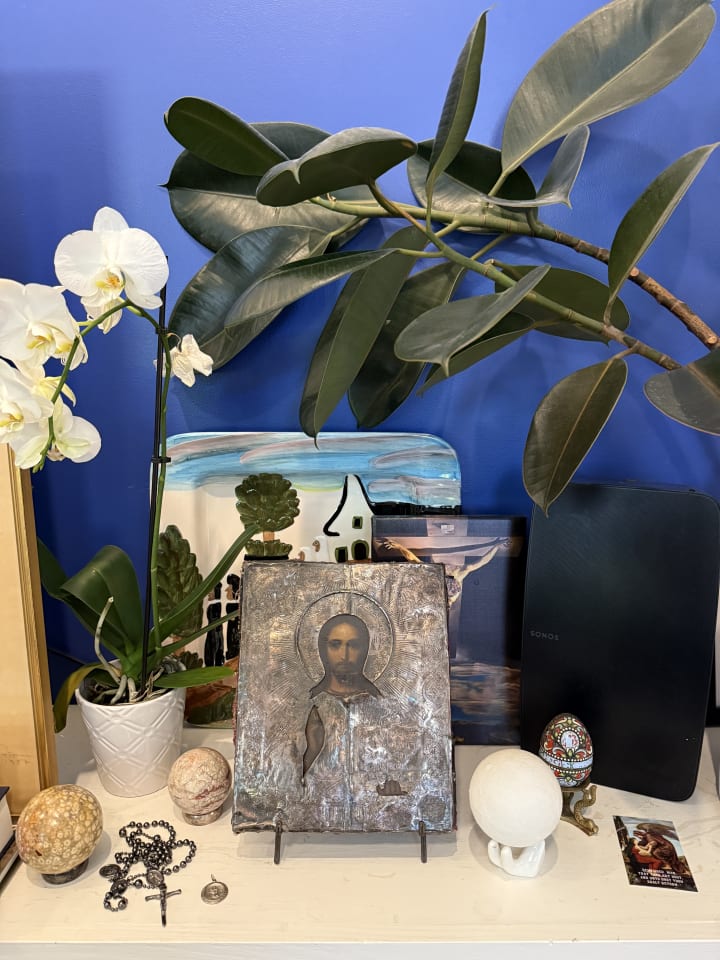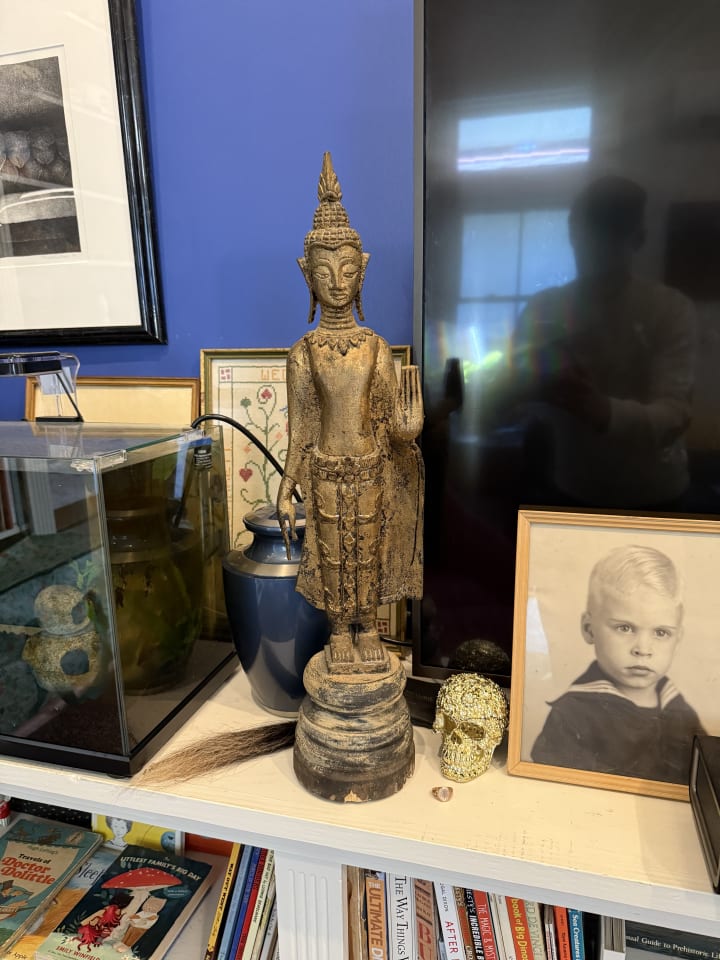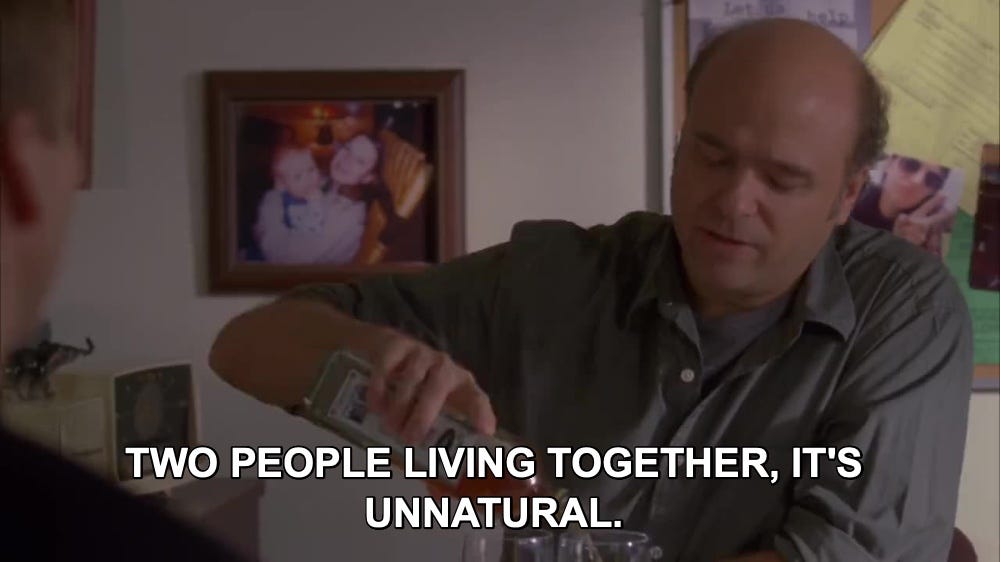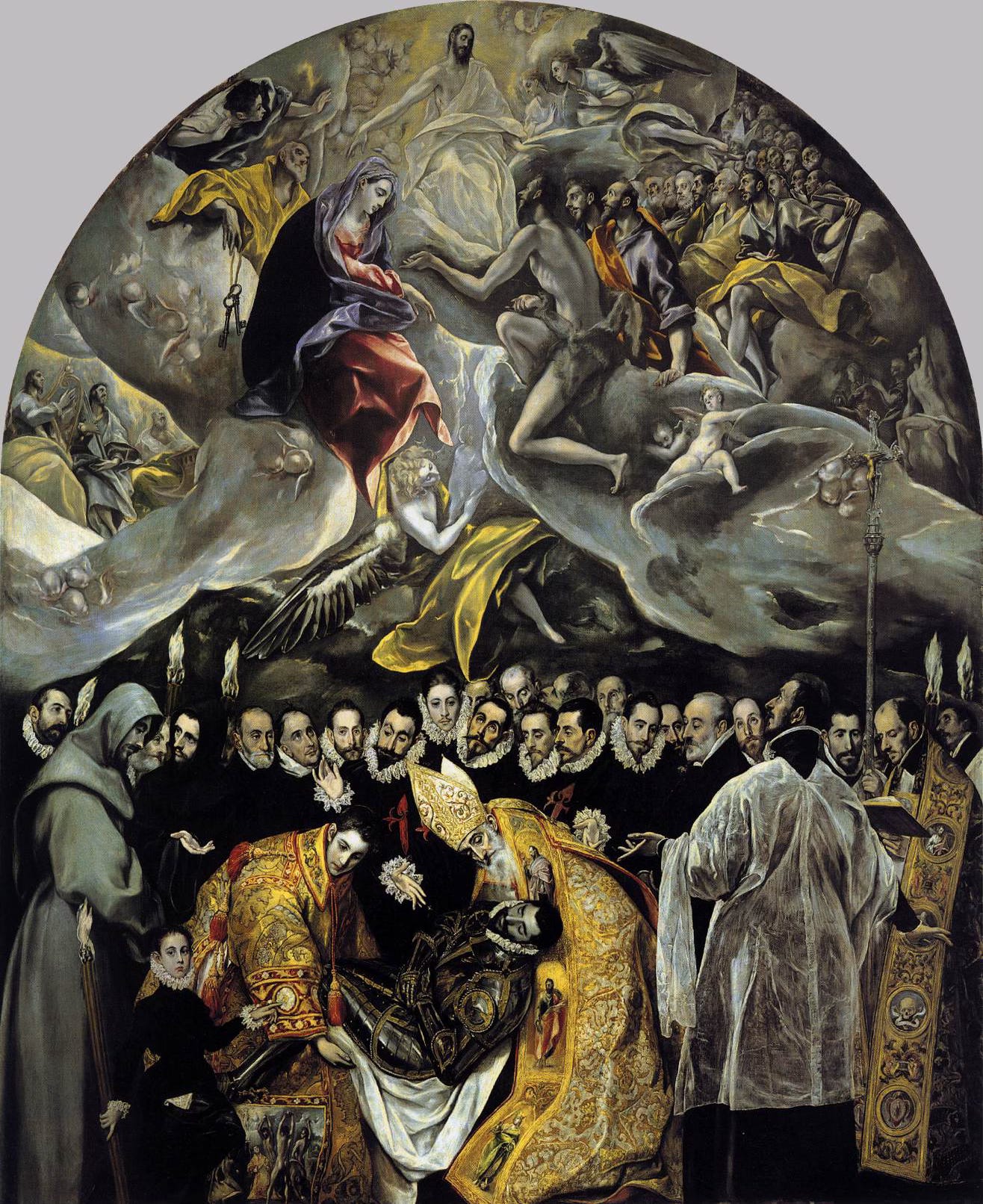Eat My Shorts 6: Steely Sabrina / Dan the Carpenter, Questionable Marriages, and God
Absolutely none of this is advice.
Clarifications are, as ever, in order; tragically, I am always out of order, like a broken vending machine or a bad lawyer. Nevertheless, I want to set down a few things more precisely than I have previously. But first,
detected a theoretical harmony in the Spiritus Mundi and made it happen:One of their best songs, IMO; it’s too bad the damn lyrics are so dark that when I blast it with the windows down I feel legitimate concern about what people will think. Anyway, onto the rest of this slop!
One loser’s view on marriage
I have absolutely no idea whether I have a “good” or “healthy” marriage, and I wouldn’t dream of trusting that assessment to myself, let alone anyone from without; we could ask Abby, but I’m not sure she thinks about it in those terms either. We both find almost all writing about relationships to be embarrassingly wrong-headed, insufficiently mindful of the near-infinite particularity of any individual (and thus of any union), more like fan fiction for a really shallow fictional universe than anything else: “On planet Relatiotron, relationships are built on mutual respect and communication.” Thanks, doc!
As such, I certainly wouldn’t give advice, but in conversation with
, a topic came up which I’ve struggled with in the past: how should we think about our partner’s interest, or lack thereof, in our various activities?I’m sure many happy relationships are composed of shared interests —people tell me about it all the time when this subject comes up!— but I also observe that it’s extremely common for people to feel surprised and wounded that, after some number of years, their partner doesn’t seem to
find them interesting (or “funny”!)
overlap with them in hobbies or interests
be very curious about their “inner world” or “artistic self” or “political insights” (lmfao) or what-have-you
A large share of people interpret this as evidence that they’re with the “wrong” person; I’ve known at least one person who left a relationship for this reason, only to realize in a subsequent relationship that “it happened again!” Meanwhile, I know couples who find this entire question strange; my father once said, when I asked him about it, “Mills, that’s why your mother and I have friends!” And I imagine that part of what’s happened is that as the popular conception of marriage shifts from “a unique partnership with certain goals” into “a reification of best-friend-with-benefits status,” this kind of attitude has become unintelligible. That is: if your spouse isn’t your best friend, that must be bad, right?
I have no idea, but I don’t think so. I do know that Abby is not interested in many, many things I am deeply invested in. She doesn’t read what I write; she isn’t particularly fixated on my opinions or beliefs; sometimes when I start speaking, I can feel her tighten with boredom or anxiety: “Oh god, here he goes.” Shockingly, I think she may sometimes find me annoying?! Hard to imagine: me!
For some years, I felt that this meant I had picked the wrong partner; it was hard to square this with her verifiable love and support and loyalty, but I’d torture myself (and her) with these doubts. I don’t want to minimize this: it was among the hardest and most painful things I’ve ever experienced, the feeling of being “alone” and “ignored” within the relationship I expected to end those feelings permanently —lmfao, I’m sorry, it’s hard for me to even remember thinking these sorts of things seriously; as though we can end the Earthly solitude of the soul for one another!— and bring the permanent warmth of understanding and attention.
Right there, I think, you can see the problem: this approach makes parents of partners. Your parents, perhaps, should respond to every new thing you put on paper with autogenerated interest and even praise; your parents are, perhaps, supposed to erase themselves and their preferences and judgments to shower you with support. I’m not even sure it’s true of them, to be honest, but it’s at least plausible. To ask this of a partner is to ask them to distort themselves for you. And we might well ask: well, what about you? If they must feign interest when it is not organic, why should you not feign confident independence when it’s not organic? Are you to both be parents to one another, as you are both children to be placated to one another as well? Maybe you can alternate days!
Again, I know this isn’t true for everyone, but for a very large share of us, a lifelong relationship is not going to entail an effortless perpetual convergence; indeed, for many, there are psychological dynamics which push us in the exact opposite direction! Lots of us are damaged —or human— in ways that make us seek difference over union, distinction over merging; often this is because our own parents struggled with the same eternal tensions. We react against, we claw at, we evade, we hide from as often as we open, embrace, incorporate another. You can of course work to make convergence happen, and should, but you will not always be able to do so; and bear in mind: working to make convergence happen entails being less “yourself” and more of something else! It “looks like” not being “true to” yourself, which you really shouldn’t be; your self isn’t any good anyway, IMO. As Simone Weil said:
Our personality is the part of us which belongs to error and sin.
My personality is a joke, a patchwork of defects and defenses; I like it fine, but it’s nothing to insist on. Someday I will have different interests, as will Abby; someday, I won’t be able to see well enough to read, or remember things clearly enough to speak about them; someday I’ll be old, uglier, immobile, sick, scared, angry, useless; and she will be so too, if we’re lucky enough to make it that long. I just cannot imagine conditioning love on our ability to “naturally and happily align,” when I know that biology alone will someday thwart it.
Maybe Abby and I just have a bad marriage; at least one friend of mine once told me he thought so. But I think Abby loves me at a deeper level than that of “shared reading lists” or what-have-you; far be it from me to suggest that the things you consume —even intellectually, even politically, even spiritually— are not “the real you” and in fact remain mere “things,” but I at least no longer feel hurt when Abby declines to perform the equivalent of “liking” me in the way we e.g. like posts on these networks. Needing that from her, I think, was the real failure of love; indeed, I now think the entire thing was nearly the opposite of what I thought when wounded: not that Abby “didn’t like or support me enough as I am,” but that I didn’t like or support her enough as she was.
Where incompatibility remains, I have my friends, acquaintances, imagined heroes, and the Internet itself. Perhaps you’re all my parents now! Please be easier on yourselves than they were. I share all this only in case anyone is troubled, as I was. If she leaves me, I’ll let you know and you can chuckle!
My religious beliefs
Before we get into this, please remember: I have a diagnosed mental illness, one of the heavier ones; my family tree is at least 40% insane people; many have been involuntarily committed, although I’ve dodged this to date. You’re under no obligation to take a single thing I say as more than “psychotic hallucination,” and if it helps you to do so, I encourage it!
Also, I do not share this with any sense that others “should” agree or believe what I do. I think “beliefs” are extremely misunderstood and overrated as mental phenomena anyway. But in case it’s of interest:
I have very high confidence that God exists; I consider it a nearly unavoidable rational conclusion from cosmology alone, but I also feel the orientation of mind towards transcendentals is evidence as well, and so too the mystery of life’s origins and nature. (I do not count on specific “gaps” persisting; I am sure all known gaps will close, and as sure that as they do new gaps will open; you might call this “gap conservation,” and I think information theory supports this view, as does an understanding of science as “progressively improving misconceptions / metaphors”).
If this is of interest, I’ve written about it before, but I’d recommend
’s work most; his newest book, All Things Are Full of Gods, is quite good on the issues and up to date with counterarguments.
I have high confidence —less, though— that the God who created existence itself is interested in this universe and in us, each of us, and that this interest and the creation are purposive or teleological. I believe, in other words, that we are “important” to God, and that all of this is “for something,” and that it’s therefore reasonable to consider the possibility of “authorial interventions,” for example, as well as to search actively for what that “something” might be / what it means for us individually.
I believe in almost all traditional Christian claims; I likewise believe in many Buddhist claims; and I have often found claims I believe within Hinduism, Judaism, Islam, and so on. Where they conflict, I assume the fault is with my reasoning or the necessarily partial view any one human mind can have on the subject. Given my (unrelated) beliefs about time and space and the multiverse, I don’t find these conflicts troubling in the least.
I think if I had to choose between “all religious claims are true” and “no religious claims are true,” I would achieve a much more accurate picture of reality accepting the former than the latter; as such, parsing disagreements among religions is of relatively little interest to me, even as I acknowledge that there is much corruption and falsity in every religion, that God may want us to parse, that God may consider our choices extremely critical, etc. Broadly: I haven’t met a religion I don’t see God in; I also haven’t met a religion that isn’t absolutely replete with insanity and error, etc.
I believe that humans have souls; that souls are different from minds; that minds are different from “brains”; and that arguments to the contrary invariably wind up requiring maximally absurd contortions, contortions so wild that they’re substantially less plausible than even the most “childish” religious explanations.
I suspect that there is an afterlife; I don’t know anything about it.
Apart from being an actual crazy person, my “credentials” for this domain are pitiful: I was a “religious studies” major at the Louisiana State University and Agricultural and Mineral College, but mostly because it’s the most fun major in the liberal arts (you can literally study anything; I learned to play gamelan one semester lol). I’ve spent most of my adult life trying to stay up to date on physics and related sciences, as well as “theory of mind” developments, AI, etc. Which is to say: I’m a real idiot, but I didn’t come to this from a place of confidence; I identified as an atheist or agnostic for many years, especially before I started taking cosmology seriously. You should feel free to disregard this all, but it’s not something I “felt” my way to, and indeed the degree to which I “felt” these things often made me more skeptical.
The sources which led me to this are too many to mention, and in some cases too obvious, but: the aforementioned
and Simone Weil, as well as CS Lewis, Karl Popper, David Deutsch, Flannery O’Connor, Ilya Prigogine, Roger Scruton, Milan Kundera, and Plato all played significant roles, as well as many teachers and friends and experiences and Internet posts (including on Substack), and especially , whose own deep reading in Buddhism and much else he’s shared with me over the years. The primary and secondary texts of the world’s religions were critical as well, although I used to resist them a bit because of what I assumed was the “motivated” nature of their authors, something I no longer really think is important to their truth status.Here’s my incoherent little home altar, made mostly from things I snagged from my parents after they died:


Every day, I do the morning and evening services in the Book of Common prayer; I pray the rosary at night and during the day if I remember or feel I need to; and I read Streams in the Desert, or sayings of the Desert Fathers, or CS Lewis, or Cassian, or whatever else seems to address the part of me that is growing towards this (again: for whatever reason!). I go to church with Kizzy every Sunday too, and somewhat impossibly, it’s usually the emotional highlight of my week.
Notes I’ve liked semi-recently
That’s all for now! Sincerely: I know this is full of alienating and even controversial arguments, and I apologize to anyone rankled or disappointed. I do not ask that you even take this seriously, let alone respect the claims, but I know these topics can be off-putting even with that caveat, and I regret it. I’ll leave you with my late father’s favorite painting:







I FUCKING LOVE YOU
Man I love that Simon Weil quote LOL….
Have you read any John Wu? His book Chinese Humanism and Christian Spirituality has some great essays on eastern/western spirituality. The Lao Tzu and Saint Therese one especially is 🔥🔥